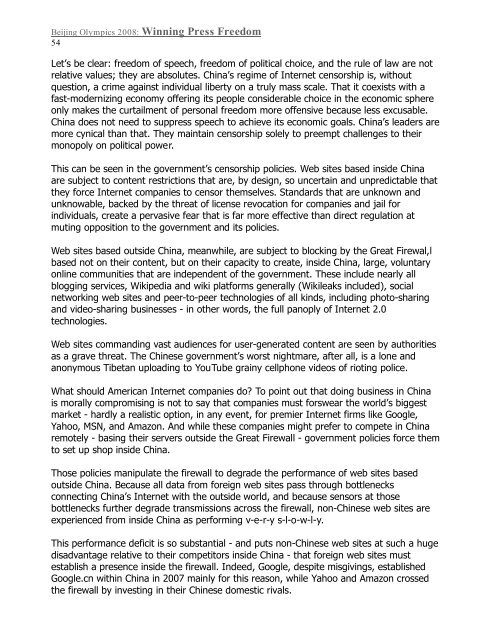Beijing Olympics 2008: Winning Press Freedom - World Press ...
Beijing Olympics 2008: Winning Press Freedom - World Press ...
Beijing Olympics 2008: Winning Press Freedom - World Press ...
You also want an ePaper? Increase the reach of your titles
YUMPU automatically turns print PDFs into web optimized ePapers that Google loves.
<strong>Beijing</strong> <strong>Olympics</strong> <strong>2008</strong>: <strong>Winning</strong> <strong>Press</strong> <strong>Freedom</strong><br />
54<br />
Let’s be clear: freedom of speech, freedom of political choice, and the rule of law are not<br />
relative values; they are absolutes. China’s regime of Internet censorship is, without<br />
question, a crime against individual liberty on a truly mass scale. That it coexists with a<br />
fast-modernizing economy offering its people considerable choice in the economic sphere<br />
only makes the curtailment of personal freedom more offensive because less excusable.<br />
China does not need to suppress speech to achieve its economic goals. China’s leaders are<br />
more cynical than that. They maintain censorship solely to preempt challenges to their<br />
monopoly on political power.<br />
This can be seen in the government’s censorship policies. Web sites based inside China<br />
are subject to content restrictions that are, by design, so uncertain and unpredictable that<br />
they force Internet companies to censor themselves. Standards that are unknown and<br />
unknowable, backed by the threat of license revocation for companies and jail for<br />
individuals, create a pervasive fear that is far more effective than direct regulation at<br />
muting opposition to the government and its policies.<br />
Web sites based outside China, meanwhile, are subject to blocking by the Great Firewal,l<br />
based not on their content, but on their capacity to create, inside China, large, voluntary<br />
online communities that are independent of the government. These include nearly all<br />
blogging services, Wikipedia and wiki platforms generally (Wikileaks included), social<br />
networking web sites and peer-to-peer technologies of all kinds, including photo-sharing<br />
and video-sharing businesses - in other words, the full panoply of Internet 2.0<br />
technologies.<br />
Web sites commanding vast audiences for user-generated content are seen by authorities<br />
as a grave threat. The Chinese government’s worst nightmare, after all, is a lone and<br />
anonymous Tibetan uploading to YouTube grainy cellphone videos of rioting police.<br />
What should American Internet companies do? To point out that doing business in China<br />
is morally compromising is not to say that companies must forswear the world’s biggest<br />
market - hardly a realistic option, in any event, for premier Internet firms like Google,<br />
Yahoo, MSN, and Amazon. And while these companies might prefer to compete in China<br />
remotely - basing their servers outside the Great Firewall - government policies force them<br />
to set up shop inside China.<br />
Those policies manipulate the firewall to degrade the performance of web sites based<br />
outside China. Because all data from foreign web sites pass through bottlenecks<br />
connecting China’s Internet with the outside world, and because sensors at those<br />
bottlenecks further degrade transmissions across the firewall, non-Chinese web sites are<br />
experienced from inside China as performing v-e-r-y s-l-o-w-l-y.<br />
This performance deficit is so substantial - and puts non-Chinese web sites at such a huge<br />
disadvantage relative to their competitors inside China - that foreign web sites must<br />
establish a presence inside the firewall. Indeed, Google, despite misgivings, established<br />
Google.cn within China in 2007 mainly for this reason, while Yahoo and Amazon crossed<br />
the firewall by investing in their Chinese domestic rivals.





